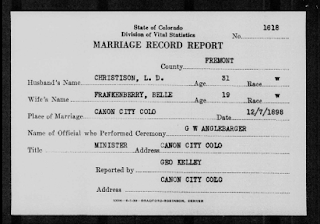Social history helps to make family history research more
interesting. However, social history, specifically food history is not
something that can be easily incorporated into every genealogist’s research. What
if you don’t have any recipes handed down from your family? How can you
incorporate food history into your family history? One way is to explore
cookbooks from the era or place that your ancestor lived in.
There are different types of cookbooks and while perusing any
vintage cookbook will provide you with ideas about what foods were available
and cooking methods, community cookbooks might provide you with a better idea
of what your ancestor may have actually ate. Community cookbooks also referred
to as church or fundraising cookbooks will be your best bet for finding recipes.
Cookbooks were published by religious, benevolent and membership groups to
raise money. In many cases being included in a community cookbook might be one
of the only times a woman’s name would appear in print. It stands to reason
that the recipes a woman contributed would be among her best. Recipes that she
actually cooked for her family and friends and that she may have even been
known for.
The other benefit of community cookbooks is that they
contain so much more than just recipes. They often include advertisements from
local businesses. These ads helped finance the publishing of the cookbook. Together
these advertisements are like having a business directory within the cookbook.
While most community cookbooks provide standardized information, there are ones
that provide histories of the organization, provide street addresses, photos
and more.
So where can you find community cookbooks for women in the
west? While community cookbooks have not always been archived because they
weren’t seen as having research value, there are libraries and archives that do
have collections of them. As you begin your search look for online catalogs of public,
private, and academic libraries, archives and museums. Make sure to also
consult manuscript collections. These collections can include recipes,
cookbooks, menus and food related ephemera.
Some websites to
consider are:
The Library of Congress has a bibliography of community
cookbooks, complete with links to digitized copies. American Church, Club, and
Community Cookbooks: Selected Titles from the General Collection http://www.loc.gov/rr/scitech/SciRefGuides/americancookbooks.html; is not a comprehensive list but is a place to
start. Make sure to look at the Library
of Congress catalog as well for additional titles. One of the cookbooks listed
is a Colorado cookbook from 1883 that starts off with the admonition “You can’t
cook in Colorado like you did [in the] East.”; http://archive.org/stream/coloradocookbook00denv#page/n1/mode/2up
It’s always a good idea to start with a local public
library. Denver Public Library has a few
community cookbooks including the 1943 West Side Christian Church Cookbook
(Denver) and the 1985 cookbook, A Book of Favorite Recipes by Christian Laity
Fellowship. First Christian Church (Loveland). The Los Angeles Public Library
has a culinary collection
that includes community cookbooks and
digitized menus.
In some cases libraries and archives have worked together to
place their catalogs on one website, making it easier for the researcher to
search many catalogs at once. Online Archive of California includes 200
academic and public libraries, museums, and archive catalogs. In some of the
manuscript collections found in this catalog you will find community cookbooks as well as family
cookbooks. Another similar library catalog is the Mountain West Digital Library.
Texas Women’s University has a Cookbook Collection
made up of donations and manuscript collections from cookbook and food ephemera
collectors. According to the website, one of the donated collections includes
community cookbooks primarily from the northwest. Baylor University in Texas
has a collection of community cookbooks from that state.
Some community cookbooks can also be found on digitized book
websites like Google Books and InternetArchive. They are not typically
categorized by the phrase “community cookbook” so make sure you use other
keywords in your search like the city or church name and the word cookbook.
Outside of the Internet there are other places to keep your
eye out for community cookbooks. Thrift and antique stores, used and library bookstores are great places to find
these works. It’s always a good idea to keep an eye on eBay.
By using search keywords like “church
cookbook” or “community cookbook” you will see listings for cookbooks from all
over the United States. Try saving a search on the name of the place your
ancestor was from to find cookbooks and genealogically relevant documents for
that area. However, in some cases the cookbook listings don’t include the place
so it might be a good idea to also conduct generic keyword searches using
phrases like “community cookbook.”
I write more about using community cookbooks and finding
them in my new book, From the Family Kitchen http://www.shopfamilytree.com/from-the-family-kitchen.
What are some places that you have found community
cookbooks? Do you know of any local collections? Have you found your ancestor
in a community cookbook?



